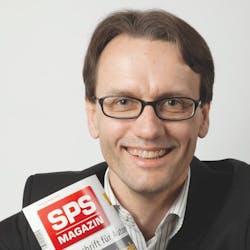Sometimes it’s interesting to stop for a moment and delight in the technological progress made to date. I’ve been working for more than 20 years in the field of automation technology, and I’ve actively experienced the many transformations that have occurred in this field. The last 10 years in particular have been shaped by dramatic changes in technology and market.
At the end of the 1980s, I had my first experiences with automation technology. I started with applications in programming and commissioning of machinery, then I worked in sales and later in marketing, and now I’m a chief editor in the technical press.
In the beginning of my automation career, some critical voices were being raised because, in the final decades of the 20th Century, the field of automation was widely regarded as a job destroyer. But how I saw the global manufacturing economy play out over the past two decades has proven this sentiment to be incorrect. Without automation, the same thing that happened to many industrial nations would have also happened in Germany: a high level of de-industrialization.
Indeed, there was “production flight” to countries where it’s possible to produce products at a lower price, but automation succeeded in keeping a comparatively high share of industrial production in Germany. Now, Germany is in the fortunate position that both manufacturers and users of automation technology are located here in large numbers. Both electrical engineering and mechanical/plant engineering disciplines are now present in numerous medium-sized businesses.
As for automation technologies themselves, I believe the biggest changes in the industry have occurred around electrical automation, which has come to be characterized by the world of information technology. Examples of this include the adoption of consumer technologies in industrial PCs, as well as proliferation of the use of Ethernet, Web technologies, object-oriented programming and multi-touch or gesture-based controls in many industrial automation devices. This is a very exciting development that presents new challenges to manufacturers and users.
Machine-to-machine communication, cyber-physical systems and the factory of tomorrow are now more than buzzwords. Self-organizing production systems are much more than the crazy notion of a handful of technological eccentrics who lost their footing. The circles of automation technology are expanding more and more. New fields of industry, energy, economy and daily life are being automated. The borders have become blurred and suddenly we’re surrounded by automation technology without noticing it.
You don’t have to be a prophet to forecast a great and successful future for the automation industry. The success story continues, and it will remain exciting to take an active part in it.
>>Martin Buchwitz, [email protected], is Editor in Chief of SPS-Magazin in Germany.
About the Author
Martin Buchwitz
editor

Leaders relevant to this article:
